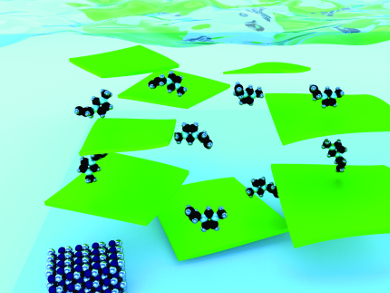The development of new exfoliation routes for layered materials is of interest due to the broad range of possibilities provided by 2D materials, ranging from fundamental physics to ultrathin functional devices for various applications from microelectronics to sensing.
Bettina Lotsch, Max Planck Institute for Solid State Research, Stuttgart, and Ludwig-Maximilians-Universität, Munich, as well as Nanosystems Initiative Munich (NIM) and Center for Nanoscience, Munich, all Germany, and colleagues have developed a silver-assisted exfoliation route for layered transition-metal oxides that quantitatively yields single-layer nanosheets. The team uses the formation of a highly insoluble compound, AgI, as the driving force for delaminating layered silver transition metal oxides with organic iodides.
The approach has two advantages over conventional acid-assisted exfoliation routes: First, the silver exfoliation route allows for the easy introduction of exotic organic ligands by using organic iodides as exfoliation agents, which has the potential to tremendously alter the nanosheet properties. Second, this exfoliation route might enlarge the portfolio of single-layer nanosheets to acid-sensitive transition metal oxides, which cannot be exfoliated via the conventional acid-assisted route.
- A New Fabrication Method for Single-Layer Nanosheets by Silver-Assisted Exfoliation,
Pirmin Ganter, Christian Ziegler, Anne T. Friedrichs, Viola Duppel, Christina Scheu, Bettina V. Lotsch,
ChemNanoMat 2017.
DOI: 10.1002/cnma.201700067



![Synthesis of [c2]Daisy Chains via Mechanochemistry](https://www.chemistryviews.org/wp-content/uploads/2025/04/202504_RotaxanesWithSolidStateMechanochemistry-125x94.png)
